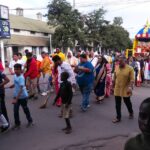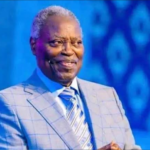COMMUNICATION BEGINS IN SONG
Published on October 9, 2012 at 6:16 PM by FACE OF MALAWI
By The Rev. Donald Schell
Two days after walking, singing, and praying with eleven Anglicans and one Lutheran across a hundred and fifty miles of the Camino de Santiago in Spain, my wife and I flew to Malawi, Africa where we’re driving distances on two lane highways crowded with pedestrians, heavy trucks, and bicycles (often laden with multiple riders or huge loads of charcoal for market) to visit community-based responses to Malawi’s AIDS crisis. When we turn off the pavement, we bounce along dirt tracks to visit village home-based care (HBC) programs, orphan feeding programs, AIDS education programs, ARV (anti-retroviral programs), and other locally generated responses to the AIDS crisis. Our Spanish pilgrimage and African project visits feel like one, and music is part of what makes that so.
My wife Ellen is the International Programs Director for Global AIDS Interfaith Alliance. Her day-to-day work is communicating with Malawi leadership (typically via email) on project development. Annually she visits to talk with local coordinators who are skilled in program and capacity development and with them she visits as many projects as possible.
Today our plans have changed, cutting short our last day’s visits in the Lilongwe (central) region. The husband of GAIA’s southern region project officer died last night, so we’re driving down to Blantyre this afternoon for the funeral tomorrow. Sr. Gertrude, GAIA’s central region coordinator will join the wake before the funeral, a whole night of singing to send the deceased man on with blessing, an old African custom that fits well with Christian hope and practice. Gertrude is a Roman Catholic. Alice, whose husband died, is CCAP (Church of Central Africa, Presbyterian). I’ll wear my collar to the funeral tomorrow, as other Anglican clergy will. Baptists and Living Waters (African Pentecostal) Church members will join the singing. African Christians take easily to ecumenism. And tomorrow’s funeral will be full of singing. Mourning or joy, sorrow, or hope – African cultures greet all with singing.
Prayer and singing have greeted us at nearly every project we’ve visited. Four iterations of All Saints Company’s “Music that Makes Community” workshops – two in San Francisco and two in New York with another coming up in Iowa have me listening carefully for how people make the music we’re hearing.
Here’s a typical scene: a lead singer makes a quiet opening call and sets up a rhythm with her or his feet, the group responds with feet shuffling in simple step laying down a gentle but steady percussion. The leader then offers a strong call – singing out the central refrain. A couple of other leaders join in harmony and they sing it through to a moment of sung cue when the whole chorus joins in – sometimes forty singers. Leaders continue to improvise. The melodic and harmonic paths are known and give a frame for improvisation. The English words we hear are about our visit, about the work the people are doing together – caring for orphans or doing AIDS education, and they’re nearly always about the grace of God, and giving thanks. The music practices shared authority. Learning and singing are completely continuous. Harmonies weave men and women, boys and girls together.
In all the fractious debate in our Anglican communion, we have managed, at least sometimes, to remind ourselves that ‘communion’ isn’t something we make or earn. Sometimes, at least, we remember that communion is what we do together that makes us one. I hope bishops at this summer’s Lambeth Conference will remember that communion is neither an enforced human artifact of pure unity nor a reward for agreeing that everyone like us is right and everyone not like us is wrong. But can we find our way without singing together when music is an essential nutrient in the fertile ground from which communion springs? Does this sound like overstatement? I do mean it.
Walking the Camino we began each day with teaching our group (eight out of twelve of us speaking no Spanish) the Padre Nuestro, The Lord’s Prayer in Spanish. We found this a surprisingly grace-filled exercise in old-fashioned rote memorization. It gave us all a way to pray with our Spanish sisters and brothers when we attended pilgrim masses along the way. And our pilgrims prayed the prayer, phrase by phrase as they walked (and sometimes we sang too, even walking alone).
Singing (like our day by day memorization of the Padre Nuestro) offered us freedom and trust in a caring relationship growing from learning by imitation. Each morning before our daily Padre Nuestro, our group sang together, exploring treasures of hymnody that recall the way to God as journey and pilgrimage. We also drew daily from Church Publishing’s soon to be released Music By Heart, Songs for Evening Worship. Music by Heart is All Saints Company’s first published contribution to a church-wide and international recovery of music we learn by ear and by heart. In this we gratefully follow John Bell’s lead. From the Iona Community he and others in other settings are also at work building community by singing together.
In Music that Makes Community (with a conscious nod toward traditional singing and African choral folk music) we’ve worked with a group of musician-liturgists from around the U.S. commissioning, collecting and teaching people to lead congregations in the music that comes to us by hearing and imitation, listening that takes the mind directly to the heart.
But what has this got to do with communion? In his book Singing Neanderthals Stephen Mithen argues compellingly that melody and ritual gesture were the fertile soil of humanity’s primal communication and community. Speech began in tonal expressions of hope, request, urgency, frustration, command accompanied by demonstrative gestures. Primal sentences expressing desires, fears, requests, warnings, and exhortations were the sea from which living words and powerful abstract ideas emerged. There’s a good summary review of Mithen’s book on-line in the Journal of Evolutionary Psychology – Mithen’s book fits beautifully with Louis Weil’s (Liturgy Professor at Church Divinity School of the Pacific) observations, “Our bodies are the instruments of prayer,” and “The meaning of the ritual is learned in the experience itself.”
Human communication begins in singing together. Language, which began singing, has been our essential means of discovering and describing truth. Our church crisis is the crisis of a “not-listening process,” the opposite of singing together. Our divisions deny the personal and relational quality of truth. We’ve fallen to thinking with the mind in the head rather than in the heart. (“Thinking with the mind in the heart” is Parker Palmer’s insightful appropriation of the Eastern Church’s teaching in the Philokalia that true prayer begins when we pray with the mind in the heart.)
Music is communal, and making music together builds relationship (and shares authority among all who sing or play). I’ve heard this shared authority and community making in the kitchen at Wendel’s Guest House where we’ve been staying this week in Lilongwe. The guys in the kitchen sing and talk as they work, trading musical phrases, familiar songs, ideas, and gossip back and forth.
And every project we’ve visited – school, church, or village has greeted us with song (and often song and dance). Women, men, and children’s voices begin in simple response to a refrain, drums support and encourage, bodies move. Words and tunes are modeled by a leader, picked up by the group, and improvised. “We sing a song of welcome, welcome our dear vistors, welcome dear GAIA!”
Singing is a natural and graceful practice of community building and spiritual formation. Imitation and memorization give us a framework of relationship and a means of thinking together.
Where has music gone in Western and particularly American culture? Why do we imagine that there are people who can’t sing?
Our technologically shaped, individualized culture has forgotten that truth is ultimately relational. Could this relational (and musical) quality of truth be what makes the Nicene Creed more believable to some people when it’s sung together rather than when it’s said? Singing together enacts what the creed teaches – that God in Trinity is a perichoresis (the Greek word for a circle dance that the drafters of the Nicene Creed used to describe the personal and relational quality of the mystery of God).
At dinner here in Malawi we were talking with a distinguished Malawian physician who did her advanced training in the Great Britain. “People in Europe and America don’t seem to notice how fragmented their societies have become,” she said. “Here in Africa we assume that we are in relationship with everyone. We talk. Your society is framed to minimize person to person contact, to make it all optional or by choice. One week in England I decided to see how little I could talk to people I didn’t know. I bought a weeklong bus pass that I had only to flash to the driver to get on the bus. I used the automated teller. I shopped for my groceries without saying a word.” She wondered what we are doing when we allow ourselves to choose whom we will be human with.
So, we argue in written prose (not even using the melody of our face to face speaking voices). Do we actually believe we can enact church union without singing together, without the gestures and movements that make sacraments?
Unlike today’s church, Jesus didn’t think music was a decorative luxury. When looking for an image for an unresponsive generation, he pointed to the people in the marketplace annoyed with the children playing at ‘weddings and funerals.’ What sort of generation doesn’t welcome the kingdom? A commerce-preoccupied marketplace culture that can hear the prophet weeping and won’t mourn, and can hear the messiah piping and singing and won’t dance. It’s no surprise in Mark and Matthew’s accounts of the Last Supper, to hear Jesus and the disciples singing a hymn together before they went out to the mount of olives, that is, before their teacher went out to face betrayal, imprisonment, torture, and death. Seeing what was coming, Jesus didn’t offer his disciples a last word, after he’d taught and shared the meal again, he sang with them, making a community to gather God’s strength and blessing. Liturgical scholars tell us they probably sang Psalm 136 that night, a hymn of victory to mark the end of the ritual meal with a celebration of God’s unfailing love in the face of adversity.
Commands or exhortations to sing come up repeatedly (and emphatically) in the epistles – Romans 15:4-14; I Corinthians 14:15; Ephesians 5:19; Colossians 3:11-21; James 5:8-18; and the apocalyptic vision of God’s triumph in Revelation is also punctuated with song (Revelation 5:9; Revelation 14:3; Revelation 15:3). Two of the most powerful theological formulations in the New Testament – John 1 (‘In the beginning was the Word…’) and Philippians 2 (‘Let this mind be in you which was in Christ Jesus…’) claim theological authority for the community’s hymns.
Music is relational and of the moment. Listening to one another as we sing, our music unfolds in time, in breath, and in rhythm. Timeless ideas, concepts without heart cannot live or build community. Truth that is not relational marginalizes and kills for the sake of “consistency.” Our world came to be in song lines, hearing and imitating, call and response, and improvisation. Singing is humanity’s original listening process, knowing the other in love.
We can’t make music without sharing authority. Everyone contributes to a consensus of pitch and rhythm. Our primal language counts on my relationship to you and yours to me for us to work together. Any language in which I can be all alone in my right opinion or doctrine has severed itself from the human root of music and gesture. We may suspect the other churches in the communion don’t get our ‘baptismal covenant’ but it looks to me like our grassroots, democratic church, for all the important discoveries it HAS made about relationship and love, needs the nurture of much more African-style singing.
The Rev. Donald Schell, founder of St. Gregory of Nyssa Church in San Francisco, is Creative Director of All Saints Company, working for community development in congregational life focusing on sharing leadership, welcoming creativity and building community through music. He wrote My Father, My Daughter: Pilgrims on the Road to Santiago.


